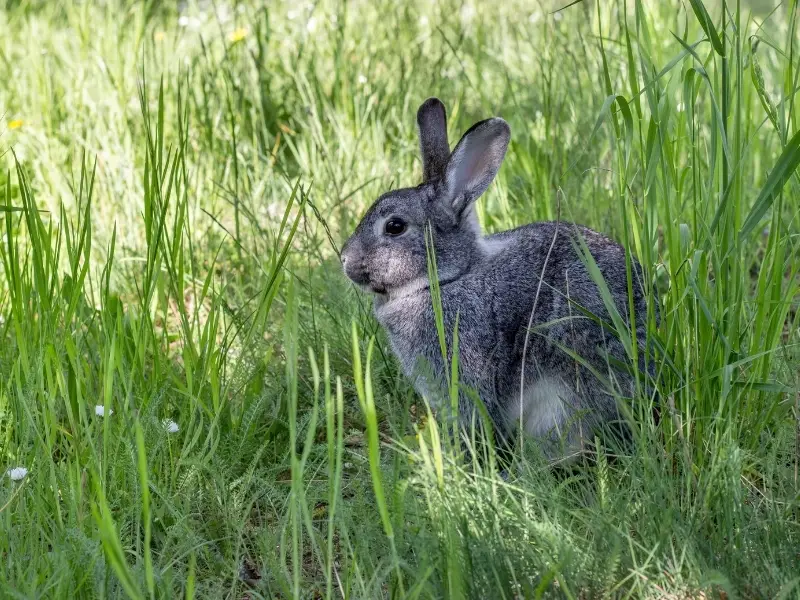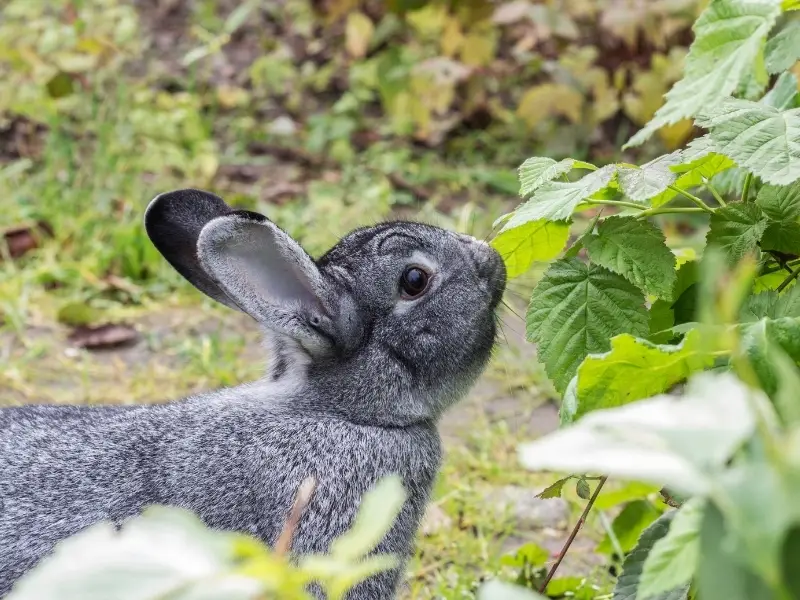The American Chinchilla rabbit is one of three chinchilla rabbit breeds recognized by the American Rabbit Breeders Association. These bunnies fall somewhere in the middle, being larger than a Standard Chinchilla and smaller than the Giant Chinchilla rabbit.
But, are American Chinchilla rabbits good pets? American Chinchilla rabbits make wonderful pets to people of all ages and families with older kids. Known for their docile, easy-going, and playful natures Chinchillas enjoy being handled by their owners. They also like to play and are best suited for large homes with enough space to roam around.
If you are looking for a sweet, cuddly, and fluffy pet rabbit, the American Chinchilla is a perfect choice! Keep on reading to find out more about this rare breed and why they make excellent pets and companions.
What Is a Chinchilla Rabbit?
Also known as the Heavyweight Chinchilla, the American Chinchilla is a breed of domestic rabbit. Despite their name, these rabbits aren’t in any way related to chinchillas, which are a species of rodent.
American Chinchillas were developed in the United States for their meat and fur. However, with the demise of the rabbit fur industry in the late 1940s, their numbers dwindled. The American Chinchilla is the rarest of all Chinchilla breeds and is included on the American Livestock Breeds Conservancy list as a breed to watch (source).
Chinchilla Rabbit History and Origin
The American Chinchilla was developed by breeding Standard Chinchillas for a larger size.
Standard Chinchilla rabbits were developed by French engineer M.J. Dybowski and were first shown in 1913 in Saint-Maur, France. The breed’s short and soft coat that’s the color of an actual chinchilla became an instant hit in the fur trade, making the Standard Chinchilla an ideal fur rabbit.
In the summer of 1917, Mrs. Haidee Lacy-Hulbert of Mitcham Surrey imported the first Chinchilla rabbits in England. A British exhibitor presented a shipment of these rabbits at the New York State Fair in the United States in 1919.
After the show, he sold his entire stock to Edward H. Stahl and Jack Harris. The American breeders set off to produce a larger and hardier Chinchilla rabbit breed since the original Standard Chinchillas weighed a mere 5 to 7.5 pounds.
Through selective breeding, the breeders created a larger rabbit capable of producing more meat and fur. In 1924, the American Chinchilla was accepted by the ARBA and is today the rarest of all Chinchilla breeds.
Chinchilla Rabbit Characteristics

Originally developed for their meat and fur, Chinchilla rabbits have stocky bodies and hardy musculature that helps them adapt to all types of living conditions.
When compared to other Chinchilla breeds, the American Chinchilla is the middle-of-the-road rabbit. They aren’t as large as Giant Chinchilla rabbits but are larger than Standard Chinchillas.
Size, Weight, Shape
American Chinchillas have a commercial body type and are large in size. Male Chinchilla rabbits (bucks) generally weigh from 9 to 11 pounds. Females (does) are slightly larger than males and usually weigh from 10 to 12 pounds.
Color Varieties
The American Chinchilla rabbit comes in only one color, and that’s the color of the actual chinchilla. The coat’s color is the breed’s signature trait which made them popular in the first place.
The coat of American Chinchillas consists of complex bands of blue, black, and white, over a blue-grey undercoat. The rabbit’s eye circles are well-defined and of light pearl color. The underside of the American Chinchillas tails is white while the topside is mostly dark with a few white hairs.
American Chinchilla rabbits can have brown, blue-gray, or marbled-colored eyes. However, dark brown eyes are preferred.
Coat
These bunnies have incredibly dense, short, and soft rollback fur that doesn’t need much maintenance to stay in perfect condition. Like all other rabbits, the American Chinchillas will shed during spring and fall. Meaning there will be more bunny hair for you to clean!
To reduce the amount of loose hair and to keep the coat clean, brush your American Chinchilla twice a week during the shedding season. In the off-season, simple weekly grooming will suffice and help keep your rabbit’s coat clean.
Lifespan
The American Chinchilla rabbit has an average lifespan of 5 to 8 years. However, many of these rabbits live longer when properly cared for and taken to regular veterinary checkups.
Temperament
Chinchilla rabbit breeds were primarily developed for their meat and pelt, so they are used to being handled by people. The fact that these bunnies are at ease when picked up and held makes them fantastic pets to singles, couples, seniors, or families with older children.
When it comes to temperament, you’ll hardly find a more pleasant companion than the American Chinchilla rabbit. These bunnies make docile, playful, and sweet pets that like to spend time cuddling with their families or playing with toys.
While their easy-going and amiable nature makes them ideal for older kids, American Chinchillas aren’t recommended for young children. However, if your children know how to interact and handle a rabbit properly and with care, the American Chinchilla might be the perfect pet.
Chinchilla rabbits aren’t overly energetic but they like to play and explore. To keep your pet rabbit mentally stimulated make sure they have interesting toys to play with (source).
Don’t forget that all rabbits react to toys differently. While some are content playing with toilet paper rolls others won’t settle for anything less than a store-bought toy. Whatever it may be, just make sure that the toy is safe for rabbits and won’t break into million pieces that your bunny can swallow or choke on.
While not the easiest pets to train, all rabbits, including the American Chinchilla can be trained to use a litter box. Litter training a rabbit is a bit more difficult than training a cat or a dog, but it isn’t impossible with the right approach.
As it turns out, many owners find that placing several litter boxes all over their homes minimizes the number of accidents and helps their rabbits learn where they should pee and poo. To make potty training more enjoyable for you and your pet rabbit use a lot of tasty treats and praise.
Chinchilla Rabbit Care
The American Chinchilla rabbit doesn’t have any specific care requirements and needs exactly the same things all other rabbits need. When coming up with a care routine for your pet rabbit, here’s what you need to consider:
Enclosure
American Chinchillas are hardy rabbits that do well living both indoors and outdoors as long as they aren’t exposed to extreme weather conditions. Outdoor enclosures or hutches should be lifted from the ground and properly fenced so to keep your bunny safe from predators.
Considering the American Chinchilla’s size, indoor cages need to be large enough to allow the rabbit to sit, stand, stretch, and hop comfortably. The cage should be made from sturdy and durable wire and have a plastic bottom that won’t chafe or irritate your rabbit’s feet.
To make the cage even more comfortable, line the inside with rabbit-safe bedding such as hay, wooden pellets, or shredded paper. Spot clean the bedding every day and remove it completely once a week to maintain hygiene inside the enclosure.
Diet
When it comes to food, the American Chinchilla’s diet is completely the same as the diet of all other rabbits. Your rabbit’s diet should consist of 70% hay, and the rest should be made of equal parts fruits, vegetables, and pellets.
Besides regular meals, make sure that your pet rabbit has unlimited access to freshwater.
Health
The American Chinchilla rabbit breed is generally healthy and isn’t prone to any hereditary health problems. Still, like all other bunnies, they too can suffer from common rabbit diseases.
As you probably already know, rabbit teeth never stop growing and the only thing that prevents them from becoming overgrown is a diet rich in hay. Chewing on hay naturally files a rabbit’s teeth keeping them at an ideal length and preventing painful dental problems (source).
If your bunny’s teeth seem longer than they should be, add more hay to their diet. However, if the teeth have already become overgrown you’ll need to take your rabbit to the vet to file their teeth.
If you decide to keep your American Chinchilla rabbit outdoors, check their ears for mites regularly. Also, you’ll need to carefully inspect your bunny for any signs of flystrike and spot clean their coat when necessary to prevent this potentially life-threatening condition.
Chinchilla Rabbit Price
The average price of American Chinchilla rabbits is between $40 and $100. But, since these rabbits are rare and hard to come by, you may end up paying more, especially if you’re looking for a show-quality Chinchilla rabbit.
Conclusion
The easy-going and amicable American Chinchilla rabbit makes a superb pet to people of all ages. Moderately active and playful, this large bunny enjoys human company and likes being handled and picked up.
If you are looking for a gorgeous-looking and cuddly rabbit breed, the Chinchilla makes an ideal companion!
Related Articles:

